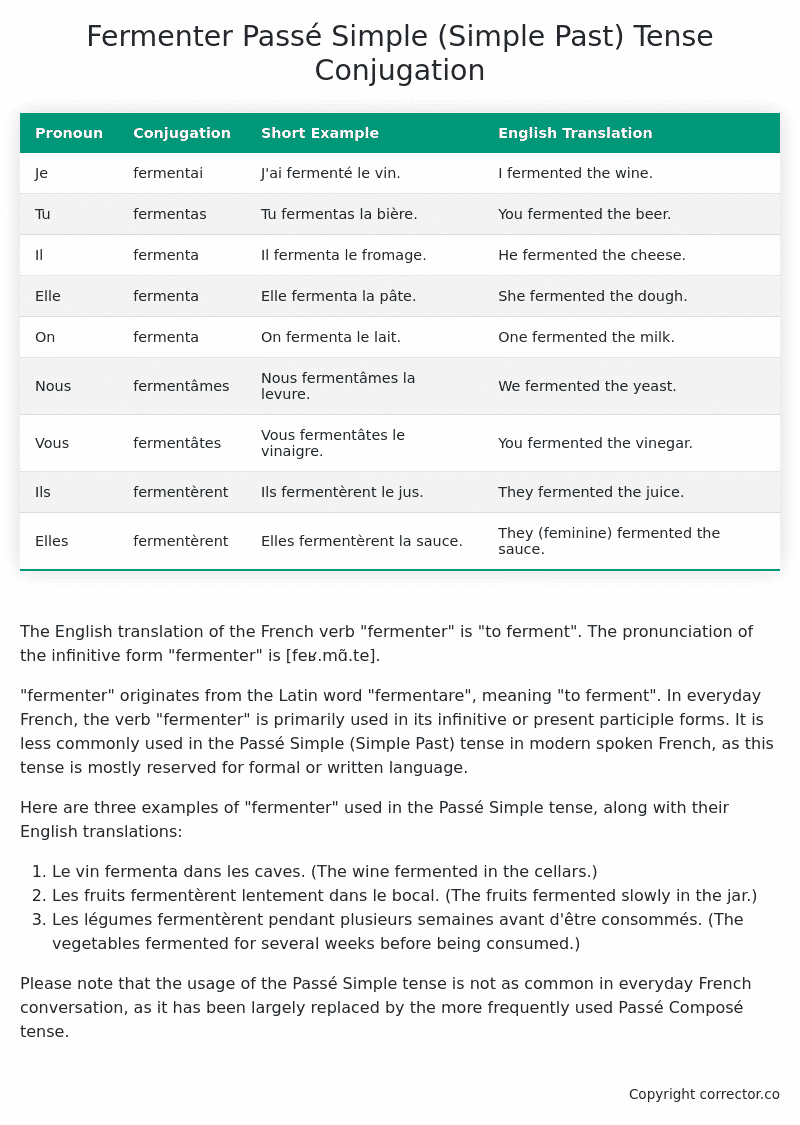Passé Simple (Simple Past) Tense Conjugation of the French Verb fermenter
Introduction to the verb fermenter
The English translation of the French verb “fermenter” is “to ferment”. The pronunciation of the infinitive form “fermenter” is [feʁ.mɑ̃.te].
“fermenter” originates from the Latin word “fermentare”, meaning “to ferment”. In everyday French, the verb “fermenter” is primarily used in its infinitive or present participle forms. It is less commonly used in the Passé Simple (Simple Past) tense in modern spoken French, as this tense is mostly reserved for formal or written language.
Here are three examples of “fermenter” used in the Passé Simple tense, along with their English translations:
- Le vin fermenta dans les caves. (The wine fermented in the cellars.)
- Les fruits fermentèrent lentement dans le bocal. (The fruits fermented slowly in the jar.)
- Les légumes fermentèrent pendant plusieurs semaines avant d’être consommés. (The vegetables fermented for several weeks before being consumed.)
Please note that the usage of the Passé Simple tense is not as common in everyday French conversation, as it has been largely replaced by the more frequently used Passé Composé tense.
Table of the Passé Simple (Simple Past) Tense Conjugation of fermenter
| Pronoun | Conjugation | Short Example | English Translation |
|---|---|---|---|
| Je | fermentai | J’ai fermenté le vin. | I fermented the wine. |
| Tu | fermentas | Tu fermentas la bière. | You fermented the beer. |
| Il | fermenta | Il fermenta le fromage. | He fermented the cheese. |
| Elle | fermenta | Elle fermenta la pâte. | She fermented the dough. |
| On | fermenta | On fermenta le lait. | One fermented the milk. |
| Nous | fermentâmes | Nous fermentâmes la levure. | We fermented the yeast. |
| Vous | fermentâtes | Vous fermentâtes le vinaigre. | You fermented the vinegar. |
| Ils | fermentèrent | Ils fermentèrent le jus. | They fermented the juice. |
| Elles | fermentèrent | Elles fermentèrent la sauce. | They (feminine) fermented the sauce. |
Other Conjugations for Fermenter.
Le Present (Present Tense) Conjugation of the French Verb fermenter
Imparfait (Imperfect) Tense Conjugation of the French Verb fermenter
Passé Simple (Simple Past) Tense Conjugation of the French Verb fermenter (You’re reading it right now!)
Passé Composé (Present Perfect) Tense Conjugation of the French Verb fermenter
Futur Simple (Simple Future) Tense Conjugation of the French Verb fermenter
Futur Proche (Near Future) Tense Conjugation of the French Verb fermenter
Plus-que-parfait (Pluperfect) Tense Conjugation of the French Verb fermenter
Passé Antérieur (Past Anterior) Tense Conjugation of the French Verb fermenter
Futur Antérieur (Future Anterior) Tense Conjugation of the French Verb fermenter
Subjonctif Présent (Subjunctive Present) Tense Conjugation of the French Verb fermenter
Subjonctif Passé (Subjunctive Past) Tense Conjugation of the French Verb fermenter
Subjonctif Imparfait (Subjunctive Imperfect) Tense Conjugation of the French Verb fermenter
Subjonctif Plus-que-parfait (Subjunctive Pluperfect) Tense Conjugation of the French Verb fermenter
Conditionnel Présent (Conditional Present) Tense Conjugation of the French Verb fermenter
Conditionnel Passé (Conditional Past) Tense Conjugation of the French Verb fermenter
Conditionnel Passé II (Conditional Past II) Tense Conjugation of the French Verb fermenter
L’impératif Présent (Imperative Present) Tense Conjugation of the French Verb fermenter
L’impératif Passé (Imperative Past) Tense Conjugation of the French Verb fermenter
L’infinitif Présent (Infinitive Present) Tense Conjugation of the French Verb fermenter
L’infinitif Passé (Infinitive Past) Tense Conjugation of the French Verb fermenter
Le Participe Présent (Present Participle) Tense Conjugation of the French Verb fermenter
Le Participe Passé (Past Participle) Tense Conjugation of the French Verb fermenter
Struggling with French verbs or the language in general? Why not use our free French Grammar Checker – no registration required!
Get a FREE Download Study Sheet of this Conjugation 🔥
Simply right click the image below, click “save image” and get your free reference for the fermenter Passé Simple tense conjugation!

Fermenter – About the French Passé Simple (Simple Past) Tense
Formation
Usage
Narration
Historical Context
Interactions with other tenses
Passé Composé
Imparfait
Conditional and Subjunctive
Summary
I hope you enjoyed this article on the verb fermenter. Still in a learning mood? Check out another TOTALLY random French verb conjugation!


